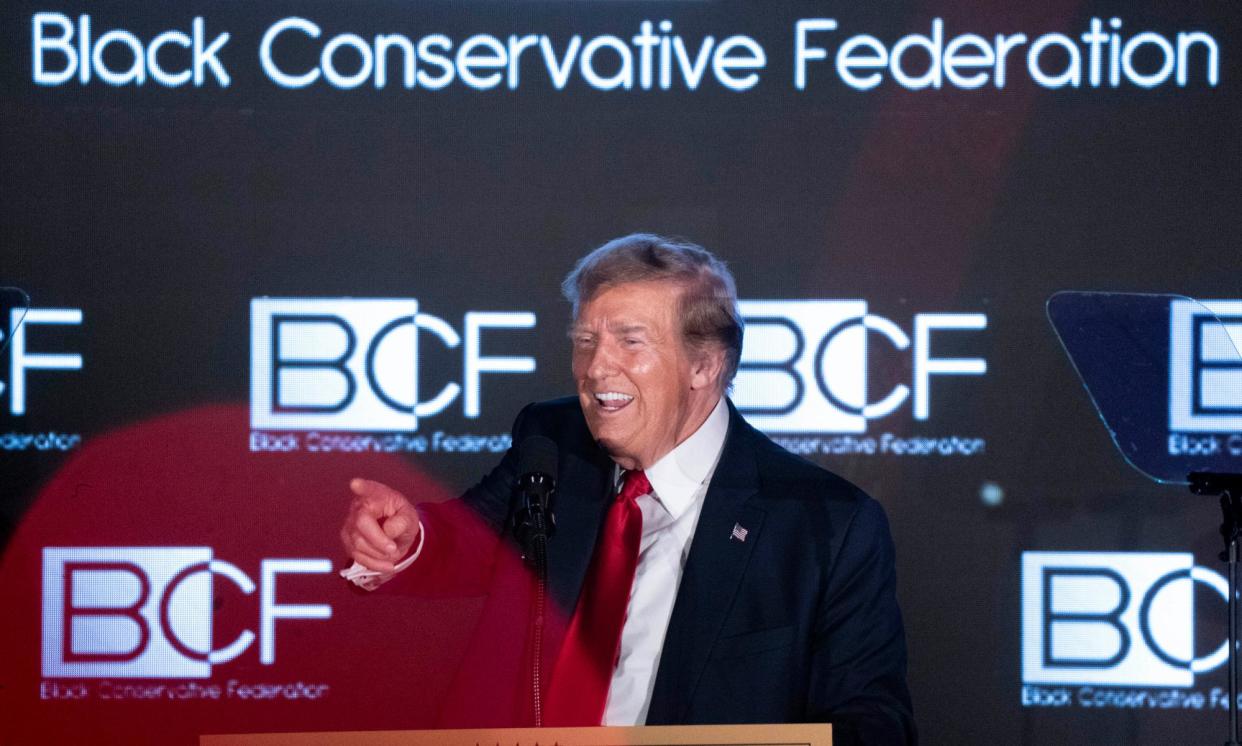Trump says racist things about Black voters. Why are some defending him?

Last month, in a room full of Washington’s most prominent Black conservatives, Donald Trump declared that Black voters are drawn to him because of his criminal indictments and mugshot.
Democrats quickly denounced his comments as “racist”. But some Black Republicans have defended Trump, claiming that “life was better four years ago under his administration” because of certain initiatives during his presidency that were geared towards Black communities.
Related: Black and Hispanic voters deserting Democratic party in large numbers, poll says
“No amount of media deception or liberal race-baiting will sway the minds of Black voters who will cast their ballots this November for safer streets, a better financial wellbeing, a secure border and a complete rejection of Joe Biden’s disastrous tenure,” Diante Johnson, the president of the Black Conservative Federation (BCF), said.
The incident puts a renewed spotlight on Black supporters of Trump, bringing into focus how these voters reconcile his racism as the 2024 election draws closer.
At a BCF gala on 24 February, where 500 Republicans gathered, Trump accepted the group’s Champion of Black America award, emphasizing support he has found in Black communities and linking it to his criminality.
“A lot of people said that’s why the Black people like me, because they have been hurt so badly and discriminated against, and they actually viewed me as I’m being discriminated against … It’s been pretty amazing but possibly, maybe, there’s something there.”
The former president continued, saying that his infamous mugshot was most embraced by “the Black population”, and claiming that Black people were “walking around” with it.
Trump, who is leading the Republican nomination for the 2024 election, has announced his intention to court Black voters, especially as polling shows an increasing dissatisfaction with Joe Biden.
On 17 February, he released the limited edition Never Surrender High-Tops, a $399 pair of golden sneakers. Republican pundits claimed that the flashy footwear was responsible for “eroding” Democratic support among Black people: “This is connecting with Black America. Because they love sneakers,” the Fox News contributor Raymond Arroyo said. Trump did not comment on the sneakers’ intended audience.
Weeks after Trump’s “mugshot” remarks, a BBC investigation found that Trump supporters were circulating artificial intelligence-generated photos of Trump with Black people. The images have not been tied to the Trump campaign.
In response to his comment at the gala, the White House press secretary, Karine Jean-Pierre, called Trump “divisive and repugnant” during a press briefing last week, the Hill reported.
“Just being very candid here, it’s repugnant, and it’s divisive to traffic in racist stereotypes … It is, again, divisive and repugnant, and it’s coming from, obviously, a former president of the United States,” said Jean-Pierre.
The National Association for the Advancement of Colored People (NAACP), though non-partisan, also denounced Trump’s comments as “delusional”.
“Donald Trump is delusional to think that his criminality would be an attractive quality to Black voters. He has taken advantage of an inherently racist system, while Black Americans have been abused by it. We are not the same,” said the NAACP president and CEO, Derrick Johnson, in a statement.
Andra Gillespie, a political scientist at Emory University, said that Trump’s “flippant” comments fit a narrative on how the former president views his relationship with certain voters as transactional.
“He’s making the claim, not that he has earned Black voters’ trust, but that Black voters owe him,” she said.
As for voter behavior, Gillespie thinks it is unlikely that Trump’s latest remarks will have an outsized impact on Black support. Most Black conservatives “are Democrats”, Gillespie said, who were not going to vote for Trump anyway.
“Conservative Black people are still more likely to be Democrats because most of them still have perceptually viewed the Republican party as problematic,” she said, referencing the University of Texas at Austin professor Tasha Philpot’s theory on Black conservatives.
And vocal Black Trump supporters – like the gala’s attendees – are equally unlikely to stop supporting Trump, Gillespie argued.
But, she said, some may be quietly less interested in campaigning for the former president.
“The question will be how enthusiastic rank-and-file, Black Republicans might be about sticking their necks out to endorse Trump,” Gillespie said.
“A lot of people in [that] audience realize that when they try to campaign for Trump in their communities, somebody is going to bring this up.”
The former president will launch new ads targeting Black voters in Michigan, Georgia and Pennsylvania this week.
